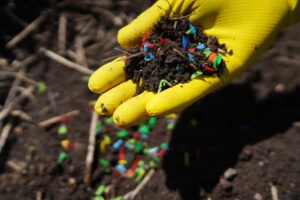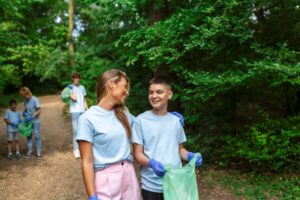
Join the Plastic Free July movement and find easy ways to cut down your plastic waste.
Did you know that the world produces 430 million tonnes of plastic waste every year? Unless we act now the United Nations warns this could triple by 2060.
Everyday choices, what we eat, how we travel, even the water we drink, all leave a mark on our environment.
The effects of climate change are damaging our environment and our health, so it helps to step back, reflect and evaluate the changes we can make to protect us, the environment, and save us money too.
Why is it important?
Plastic is building up and polluting our waters, soils, and natural spaces, and its affecting our wellbeing too. Plastic pollution has become one of the biggest environmental problems we face, and it’s getting worse as we keep producing more single-use plastics.
We see plastic everywhere, blocking up drains, covering our beaches, polluting soil across County Durham and the world.
One of the biggest plastic culprits is single-use plastics, things like bottles, food packaging, and balloons that are used and thrown away. Did you know that up to 91% of the plastic used is not recycled or disposed of correctly?
 Plastic pollution extends from our land to our oceans and makes up 85% of rubbish found in the ocean. This litter is not only affecting the water quality, but it also causes harm to our marine life. Turtles mistake plastic bags for jellyfish, seabirds peck at microplastics thinking it is food. Even large mammals like the North Atlantic whales can become trapped in discarded fishing gear. Plastic pollution is a major threat to marine life. A survey found plastic pieces in the stomachs of many marine animals, including every turtle species and almost half of all seabirds.
Plastic pollution extends from our land to our oceans and makes up 85% of rubbish found in the ocean. This litter is not only affecting the water quality, but it also causes harm to our marine life. Turtles mistake plastic bags for jellyfish, seabirds peck at microplastics thinking it is food. Even large mammals like the North Atlantic whales can become trapped in discarded fishing gear. Plastic pollution is a major threat to marine life. A survey found plastic pieces in the stomachs of many marine animals, including every turtle species and almost half of all seabirds.
Microplastics are tiny pieces of plastic, smaller than five millimetres. These small fragments can carry harmful chemicals. They break down in our environment and can end up in water, soil and our bodies. Studies have shown they can damage cells and may cause serious health issues like cancer, lung disease, heart problems, and birth defects.
That’s why it’s more important that even to tackle plastic pollution.
Join the Global Movement: Plastic Free July
Leading the way in education and empowerment is Plastic Free July. It’s a month-long campaign that helps people around the world reduce plastic waste.
Since launching in 2011, it has inspired over 100 million people in 190 countries to make simple changes at work, home, or school.
How can I get involved?
Dispose of properly
 The most effective thing you can do is dispose of plastic properly and reuse it where you can. Consider your options, can you reuse that take-away container for food prep or storage? Or that jar to make your own delicious jam? If not, make sure the item is recyclable or biodegradable, and make sure it goes in the right bin. Don’t forget to rinse food containers and remove non-recyclable parts like stickers or lids.
The most effective thing you can do is dispose of plastic properly and reuse it where you can. Consider your options, can you reuse that take-away container for food prep or storage? Or that jar to make your own delicious jam? If not, make sure the item is recyclable or biodegradable, and make sure it goes in the right bin. Don’t forget to rinse food containers and remove non-recyclable parts like stickers or lids.
Make easy switches
Reducing plastic waste means buying fewer single-use items and switching to reusable or biodegradable options. Here are a few switches you can consider:
Style Your Sips: One million plastic bottles are bought every minute worldwide. Swap to a reusable bottle and cut waste, while showing off your style. Choose from bottles made of glass, metal or wood in colours and patterns that suit you.
Plastic? Not My Bag: The average person in the UK uses approximately 200 bags every year, which on average (with plastic bags costing up to 10p) could cost you up to £20 per year. Which is a lot of money considering on average they are used for just 12 minutes. Make the switch today by purchasing strong, reusable shopping or tote bags, which also can be any size and pattern to suit you.
Clean and Green: Plastic bottles are the biggest enemy in single-use plastic waste fight, and part of this is due to the number of plastic bottles are used to contain household cleaners. A clean home takes a lot of effort, but it also includes a lot of waste. Make the switch by choosing refillable cleaning products. You also could consider reusable cleaning utensils such as fabric cloths and sponges that will ensure longevity and a cleaner home.
 Ditch the Disposables: there are many necessity items that we need that unfortunately come with a heavy amount of plastic waste and a price tag that keeps building up. Whether that’s nappies or period products, these items are needed but did you know there are so many alternatives out there that can reduce your waste and save your pocket?
Ditch the Disposables: there are many necessity items that we need that unfortunately come with a heavy amount of plastic waste and a price tag that keeps building up. Whether that’s nappies or period products, these items are needed but did you know there are so many alternatives out there that can reduce your waste and save your pocket?
- Consider the switch from disposable nappies and wipes to reusable cloth options. They also can work out cheaper – cloth nappies include adjustable straps to be used for all ages and can be reused for any future children. Additionally, Cheeky Wipes claim that by making the switch you could save at least £373. Saving the environment and your pocket one bum at a time.
- There also are many options to replace disposable period products. From menstrual cups to cloth pads and underwear, there are many options that you can choose that are better for your pocket and reduce plastic waste.
Reuse, Refill, Recycle: Refill shops are stores that sell non-packaged goods, things like food, toiletries, and cleaning products. This allows you to take what you need when you need it, saving you money by avoiding unnecessary packaging and bulk purchases, and reducing waste of plastic and food. You can find your local refill store as well as single-use-plastic-free businesses on the Refill App.
Let’s Clean Up Our Act
Start by taking part in the Plastic Free July challenge. Their website has some great and helpful resources that can get you started, including a quiz to help you see where you can cut down on plastic starting this month.
You can also take our Single-Use Plastics Pledge to show your commitment. Do as much or as little as you can, every step helps.
 Get involved in your community
Get involved in your community
Litter picking and clean-up events often pop up locally, search online to find one near you. Or you can organise your own bring together neighbours, friends and family.
If you run or are part of a local clean-up, let us know at ClimateCountyDurham@durham.gov.uk we will help spread the word.
Inspire others: Share your journey, tips, and wins with friends, family, or on social media to help others get involved.
We would love to hear from you
Share your stories, experiences, and photos of nature, and send us a few lines on how you are helping protect our environment in County Durham. Whether it is something you do personally, a community project you may be involved in, a business change or action, or even a great photo of nature. We want to celebrate and share your efforts and views.
Send us your stories or photos (with a short explanation) by emailing climatecountydurham@durham.gov.uk or by filling in our Get in Touch form and help inspire others across our beautiful county to take action. And do not forget to sign up to our Climate Change and Carbon Reduction Pledge.

